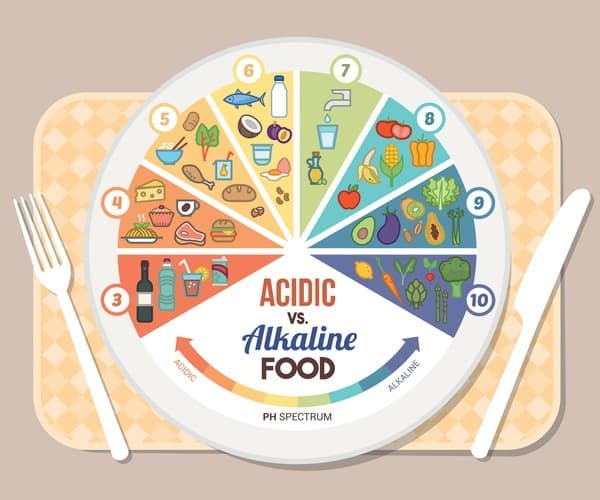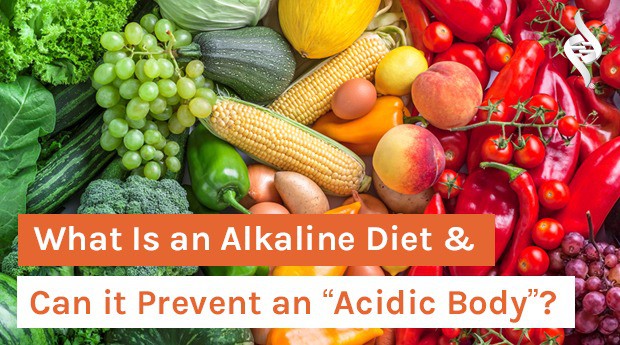What Is an Alkaline Diet & Can it Prevent an “Acidic Body”?
In a hurry? Click here to read the Article Summary...
If you’ve ever gone camping, you probably made a campfire as part of your outdoor adventure. The next morning you might have noticed that the only thing remaining in your fire pit was a pile of white, fluffy ash.
Assuming you didn’t also burn plastic or other contaminants, it might surprise you to learn that this natural wood ash is actually carbon-rich fertilizer in disguise – containing all sorts of nutrients like calcium, lime, and potassium that support a healthy environmental life cycle.

Wood ash, in general, is actually a powerful composting agent. When spread across the soil, it not only makes it more fertile but also contributes to the balancing of its pH (potential of hydrogen) through the neutralization of acid [1].
You’re probably wondering… what do campfires and the nutritive wood ash they create have to do with humans and their dietary habits?
It turns out that understanding the restorative properties of simple wood ash and how it’s created can actually teach us a whole lot about sustaining our bodies.
What Is an Alkaline Diet?
If you’re not familiar with the concept of an alkaline diet (also known as an alkaline ash diet or an acid alkaline diet), it basically involves feeding your body things that naturally help to neutralize disease-causing acidity.
Just like how the burning of wood produces natural, alkaline-forming wood ash for soils, alkaline-forming foods generate their own “ash” byproducts. These byproducts effectively “fertilize” the body’s internal cellular terrain which deters the body from becoming too acidic to the point of causing disease.
In other words, digestion of alkaline-forming foods creates nutritional “ash” that help to balance your body’s pH levels.
Are You Eating an Acidic Diet or an Alkaline Diet?

As you may already know, everything you eat gets broken down through a series of chemical reactions and metabolic processes. This creates base-level nutrients that your body is able to use for the production of energy, the building of muscle, and the perpetual creation of hormones, among other things.
Depending on what you eat, the leftover “ash” that remains after your food is metabolized either contributes to your body’s growth and well-being through alkalization, or its break-down through acidification.
When you consume high alkaline or alkaline-forming foods, you’re essentially adding more “wood” to your internal bonfire – along with nothing else that might cause it to die-out or become polluted.
But when you consume acid-forming foods, it’s kind of like throwing “plastic bottles” on a bonfire. When this trash is done burning, it leaves behind all sorts of toxic waste byproducts that contaminate the leftover “ash” and make it acidic. As a result, it’s unable to properly “fertilize” your body for continued sustenance.
Obesity Can Be a Sign of an Acidic Body
When the body is in a perpetually acidic state (meaning pH levels are too low), all sorts of bad things can happen. For one, internal stores of electrolytes such as calcium and potassium quickly plummet, as the body is forced to rob them from the kidneys in an attempt to raise pH levels back to normal.
Mineral stores in the bones, vital organs, tissues, and cells likewise become depleted, as the body pulls nutrients from where it can in its clamor to achieve acid-base homeostasis.

The loss of these electrolytes and minerals further compromises the body’s ability to absorb vitamins, as these critical absorption cofactors are now in short supply.
This is usually followed by a rapid accumulation of toxins and pathogens throughout the body, as the waste-disposal systems that also rely on these same minerals and electrolytes in order to function struggle to keep up with this toxic onslaught.
One end result of a body that’s too acidic is often obesity, as fat cells are where the body stores both toxins and excess acid.
What Is the Ideal PH of Human Blood?
The human body is programmed to maintain a balanced, slightly alkaline serum (blood) pH level of between 7.35 and 7.45. However, an acid-forming diet greatly inhibits the body’s ability to do so.
The standard American diet (SAD) is an example of an acid-forming diet that packs a one-two punch to your health.
- It lacks alkaline-forming nutrients like magnesium, potassium, and fiber.
- It also contains high levels of acid-forming unhealthy fats, simple sugars, and chemical preservatives.
The result is metabolic acidosis, which can manifest in a variety of horrific ways, most notably as an array of chronic and debilitating illnesses [2]. This is why a growing number of wellness practitioners are encouraging their patients to adopt a high alkaline diet. Eating this way has been shown to help the body more easily achieve that pH sweet spot without having to work too hard, in turn maximizing the body’s wellness potential.
Acidic Foods vs. High Alkaline Foods: Making the Best Dietary Choices
So which foods are alkaline-forming and which are acid-forming? Before answering this question, it’s important to keep in mind that just because a food is acidic in taste doesn’t necessarily mean that it’s acid-forming inside the body.
Acidic Citrus Is Actually Alkalizing Once Consumed

One prominent example of this is citrus fruits like lemons and limes. Despite being extremely acidic, lemons and limes are among the most alkaline-forming foods out there once they’re consumed.
With that in mind, here are the nuts-and-bolts of what you need to know to create a high alkaline diet [3-5] :
Alkaline-forming foods tend to be those that are raw, organically grown, and found in the produce section.
This includes whole fruits and vegetables like beets, spinach, broccoli, artichokes, Brussels sprouts, cabbage, cauliflower, carrots, cucumbers, seaweed, asparagus, kale, radishes, collard greens, and onions, as well as avocados, lettuces, celery, peas, sweet potatoes, eggplant, green beans, blueberries, pears, grapes, kiwis, melons, tangerines, figs, dates, mangoes, and papayas. All of these foods have a net alkaline effect on the body.
Apples, almonds, tomatoes, grapefruits, mushrooms, turnips, olives, peaches, bell peppers, pineapples, cherries, apricots, strawberries, and bananas are also excellent alkaline-forming foods, as is natural spring water, which is generally either slightly alkaline or neutral in pH.
Avoid or At Least Limit Acid-Forming Foods
On the other end of the spectrum are acid-forming foods, which include sodas and pretty much anything that’s processed, as well as alcohol, coffee, sugar, and conventional grains, meat products, eggs, and dairy. Consuming too many acid-forming foods while not exercising regularly and sleeping erratically is a recipe for acidosis. One that’s further complicated by high levels of stress and routine exposure to toxic chemicals.

4 Key Alkaline Diet Benefits
Alkalizing your body appears to have many health advantages. Here are 4 significant benefits to consider:
- One of the first things to happen during acidosis is that the body starts to rob electrolytes and minerals from bones and vital organs. Adopting an alkaline diet is a surefire way to keep these electrolytes and minerals where they’re needed most [6]. The result is that the skeletal system will be less prone to developing osteoporosis or bone loss; the muscular system will remain strong and vibrant; and hormone production, including in the thyroid, adrenal, and pituitary glands, will stay optimized.
- Chronic inflammation, which can affect nearly every system of the body, is another adverse effect of acidosis that can potentially be overcome, or at least greatly minimized, by adopting an alkalizing diet and lifestyle. Everything from the cardiovascular and skeletal systems, to the endocrine and central nervous systems, can thus be improved by getting rid of all that acid – which is great news for people who suffer from chronic pain.
- When the body isn’t having to siphon electrolytes and minerals from vital systems in order to fight acidosis, “powerhouse” nutrients like magnesium, which is needed for hundreds of different enzymatic processes throughout the body, are actually able to do what they were designed to do.
“Activation” of the pro-hormone vitamin D, for instance, can’t happen without magnesium present as a co-factor – meaning people with acidosis are often vitamin D-deficient, and thus have weakened immune and endocrine systems. - Alkaline-forming foods help to combat obesity by modulating leptin levels and revving up the body’s fat-burning mechanisms. By burning these fat stores, alkalization effectively releases all the stored-up acid and other toxins contained in fat tissue, allowing the body to expel them and become even more alkalized.
When the body is in an acidic state, it tries to shield itself from the worst damage by storing excess acid in fat cells. While this might protect vital organs from becoming critically damaged, the resultant changes in body composition can cause other problems, not the least of which is obesity [7].
Cancer, Keto, and the Alkaline Diet
No discussion about an alkaline diet would be complete without addressing the quintessential curse of modern medicine: cancer. Since cancer cells thrive in an acidic environment, many health proponents advocate that alkalizing your body decreases cancer risk. It’s important to note, however, that at this point there does not appear to be any published scientific studies either supporting or disproving this claim.
According to a review published in BMJ Open (British Medical Journal) in 2016, the researchers stated:
Despite the promotion of the alkaline diet and alkaline water by the media and salespeople, there is almost no actual research to either support or disprove these ideas. This systematic review of the literature revealed a lack of evidence for or against diet acid load and/or alkaline water for the initiation or treatment of cancer [8].
Coming up in another article we’ll discuss tips for combining an alkaline diet with the popular ketogenic diet.
The latest formula of Organic OrganiGreens is our best yet. In just one simple scoop, add 17 organic superfoods and botanicals, plus probiotics and enzymes, to your daily diet to fill nutritional gaps and support healthy immune function, increased energy and mental clarity, as well as digestion and detoxification processes. Easily mixes in water, smoothies, juices, and recipes, and it also tastes great – even without any added sugars.

 Sources:
Sources:
Article Summary
An alkaline diet (also known as an alkaline ash diet or an acid alkaline diet) involves feeding your body things that naturally help to neutralize disease-causing acidity.
When the body is in a perpetually acidic state (meaning pH levels are too low), it can lead to many health issues.
One end result of a body that’s too acidic is often obesity, as fat cells are where the body stores both toxins and excess acid.
Many health practitioners encourage their patients to adopt a high alkaline diet. This means consuming foods that have an alkalizing effect on the body.
Alkaline-forming foods tend to be those that are raw, organically grown, and found in the produce section.
Acid-forming foods include sodas and pretty much anything that’s processed, as well as alcohol, coffee, sugar, and conventional grains, meat products, eggs, and dairy.




Very informative and educational. thank you
Hi Nerrie, thank you for your feedback. Glad to hear you enjoyed the article.
If you have any article suggestions, feel free to let us know. We'd be happy to consider them.
Thank you so much for being here with us. Wishing you a wonderful day!
I have searched through all the articles from Organixx that I have filed for the past 2/3 years and can find Ofer eve to Psorisas. I know there is no cure but do you knows of any supplement that might help
Hello Janet, thank you for reaching out to us regarding this matter. We would love for you to take a look at the following articles that discuss Inflammatory Skin Conditions (including Psoriasis) and How Turmeric Root Is Used to Help Protect & Heal Skin:
https://organixx.com/inflammatory-skin-conditions/
https://organixx.com/turmeric-and-skin/
We hope you find them informative and helpful. Please let us know if you have more questions, we're here to help! Thank you and enjoy your weekend!
Can anybody answer this question: Consuming a plant-based diet for 6 days a week,, am I negating all that is good if I go off this diet and consume a burger or two, or other non-plant foods?
pH is more complex !Acid made by the stomac to predistruct proteins . Not ripe fruit need more to digest .The ION GAP depends salt and bicarbonate and respiration dept ! pH is co-logarithmic from hydrogen concentration ,so pH 5 is 10 times stronger pH 6 but 100 times pH 7.
pH salive or urine is not blood pH !!! Kidneys recuperate a lot of our minerals in known % , and Ca and Mg effecting pH -HCO3 also . Urine get about 10 acids from food destruction . Uric acid the most troublesome. Due ammonium decomposing the urine pH CHANGING IN MINUTES so even pH estimation versus healt meaning is difficult. Blood has a good regulating system.
Urine depends so much the digested food . Used by sickness .
Salive the digesting status
Reed; Dr REAMS Life or dead > He studied pH and 6 parameters for a lifetime !
NOW FORGOTTEN. you need pH paper in 0,1 division 5 to 8 scale. and
shoose salive 6,2 6,8 or 7,2 .depends your professor …..
Regards
F.
keep in mind 5,2 is 10 times stronger acid as 6,2 4,2 is 100 times stronger 5,2
Thank you for sharing these information with us, Frans. Have a lovely day ahead!
im very interested in this article because ive been on omeprazole for six years. One becomes totally addicted and its impossible to get off the stuff. im trying to do as much alkaline as i can. Cut out coffee sweet stuff no processed food no alcohol ; not much meat or dairy in diet. Taking probiotics. What else can I do. I never ever see an article on u tube or internet videos sent to me to advise on this problem . Is it because it isnt possible?
We are sorry to hear about that, Barbara. We admire your efforts in taking care of your health and we're glad that you found this post interesting.
Unfortunately, we have not yet published any articles that discuss about that topic as Organixx cannot diagnose, treat, or give you advice on a specific medication (eg. Omeprazole) and how to deal from its withdrawal. With this, we highly recommend a consultation with a trusted medical specialist to help you determine what other steps you can take to deal with your withdrawal.
We hope this helped and we wish you the best in your health journey!